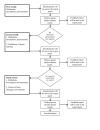Terminology, taxonomy, and facilitation of motor learning in clinical practice: protocol of a delphi study
- PMID: 23685621
- PMCID: PMC3668605
- DOI: 10.2196/resprot.2604
Terminology, taxonomy, and facilitation of motor learning in clinical practice: protocol of a delphi study
Abstract
Background: Facilitating motor learning in patients during clinical practice is complex, especially in people with cognitive impairments. General principles of motor learning are available for therapists to use in their practice. However, the translation of evidence from the different fields of motor learning for use in clinical practice is problematic due to lack of uniformity in definition and taxonomy of terms related to motor learning.
Objective: The objective of this paper was to describe the design of a Delphi technique to reach consensus on definitions, descriptions, and taxonomy used within motor learning and to explore experts' opinions and experiences on the application of motor learning in practice.
Methods: A heterogeneous sample of at least 30 international experts on motor learning will be recruited. Their opinions regarding several central topics on motor learning using a Delphi technique will be collected in 3 sequential rounds. The questionnaires in the 3 rounds will be developed based on the literature and answers of experts from earlier rounds. Consensus will be reached when at least 70% of the experts agree on a certain topic. Free text comments and answers from open questions on opinions and experiences will be described and clustered into themes.
Results: This study is currently ongoing. It is financially supported by Stichting Alliantie Innovatie (Innovation Alliance Foundation), RAAK-international (Registration number: 2011-3-33int).
Conclusions: The results of this study will enable us to summarize and categorize expert knowledge and experiences in a format that should be more accessible for therapists to use in support of their clinical practice. Unresolved aspects will direct future research.
Keywords: Delphi technique; clinical practice; consensus; definitions; motor learning.
Conflict of interest statement
Conflicts of Interest: None declared.
Figures
References
-
- Abbruzzese G, Trompetto C, Marinelli L. The rationale for motor learning in Parkinson's disease. Eur J Phys Rehabil Med. 2009 Jun;45(2):209–14. http://www.minervamedica.it/index2.t?show=R33Y2009N02A0209 - PubMed
-
- Dayan E, Cohen LG. Neuroplasticity subserving motor skill learning. Neuron. 2011 Nov 3;72(3):443–54. doi: 10.1016/j.neuron.2011.10.008. http://europepmc.org/abstract/MED/22078504 - DOI - PMC - PubMed
-
- van Tilborg I, Hulstijn W. Implicit motor learning in patients with Parkinson's and Alzheimer's disease: differences in learning abilities? Motor Control. 2010 Jul;14(3):344–61. - PubMed
LinkOut - more resources
Full Text Sources
Other Literature Sources



